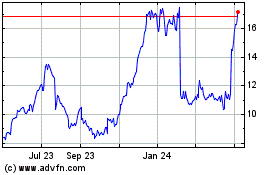Facebook to Accept Cryptocurrency Ads Again
June 26 2018 - 6:48PM
Dow Jones News
By Gabriel T. Rubin
Cryptocurrency peddlers are being let back into valuable
social-media advertising space, after Facebook Inc. eased an
outright ban on ads from the industry.
The tech company put a blanket ban on such ads in January, after
a spike in the price of bitcoin and other cryptocurrencies led to a
proliferation of new cryptocurrency products -- some legitimate,
others scams. Companies including Alphabet Inc.'s Google, Twitter
Inc. and Snap Inc.'s Snapchat soon followed with their own
bans.
Facebook will maintain its ban on advertising initial coin
offerings, which have soared in popularity recently. In an ICO, a
company creates a new virtual coin or token and offers it for
public sale.
Which cryptocurrency firms will get to advertise on the platform
will be up to Facebook's discretion. The company didn't detail the
criteria it plans to use.
"Eligibility may be subject to such conditions and restrictions
as Facebook may decide," the company says on its cryptocurrency
product onboarding request form.
Facebook said its initial ban on cryptocurrency ads was
"intentionally broad" as it worked to "detect deceptive and
misleading advertising practices." The company promised to revisit
the policy once it had conducted a sweep of existing ads that
violated its prohibition on financial products associated with
scams.
Promotional efforts for cryptocurrencies have come under fire
from federal and state regulators in recent months. In November,
the Securities and Exchange Commission warned investors about the
risks of celebrity-backed ICOs, and encouraged investors to
"research potential investments rather than rely on paid
endorsements from artists, sports figures, or other icons."
Before the crackdown, celebrities including Paris Hilton and the
retired boxer Floyd Mayweather Jr. had appeared in ads touting
crypto products.
Some fraudulent ICOs shut down by regulators don't even bother
to pay celebrity endorsers, or even refer to them by their names or
titles when using their photos.
Texas securities regulators shut down a coin offering last month
that included "client testimonials" along with photos of Prince
Charles and Jennifer Aniston. Another scheme shut down by Texas
regulators featured a photo of Supreme Court Justice Ruth Bader
Ginsburg and former U.S. solicitors general as the ICO's purported
legal team. None of these celebrities or government officials were
involved in the ICOs.
An analysis by The Wall Street Journal last month found that one
in five digital coin offerings shows hallmarks of fraud.
As part of its investor education efforts, the SEC even created
its own fraudulent ICO website -- dubbed HoweyCoin, a
tongue-in-cheek reference to a famous securities law case -- to
demonstrate how easy it is to separate unwitting investors from
their money with the help of urgent-sounding language and a sleek
website.
People who click on the "Buy Coins Now!" link are taken to an
SEC webpage that says: "If you responded to an investment offer
like this, you could have been scammed -- HoweyCoins are completely
fake!"
Write to Gabriel T. Rubin at gabriel.rubin@wsj.com
(END) Dow Jones Newswires
June 26, 2018 18:33 ET (22:33 GMT)
Copyright (c) 2018 Dow Jones & Company, Inc.
Snap (NYSE:SNAP)
Historical Stock Chart
From Mar 2024 to Apr 2024

Snap (NYSE:SNAP)
Historical Stock Chart
From Apr 2023 to Apr 2024
